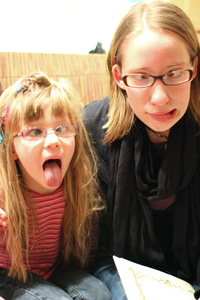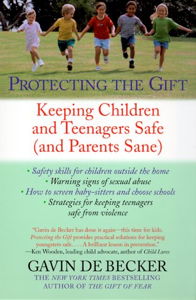We are fortunate to have a rich supply of college-age babysitters in our neighborhood (thanks to “North Park University”:http://www.northpark.edu/) — but most candidates we don’t know personally, so we have needed a reliable way to select and screen good childcare providers. Here’s the straightforward system we’ve come up with.
A couple years ago, “my friend Kindra recommended”:http://biggermuch.blogspot.com/2009/03/book-review-protecting-gift.html the book “_Protecting the Gift_”:http://www.amazon.com/exec/obidos/ASIN/0440509009/octothorppres-20 as a helpful manual for keeping your kids safe. It sounded like the kind of book I would never read (too scary!), so I passed the recommendation along to Jon. He read it, loved it, and encouraged me to read it with the words, “There _are_ scary stories in it, but they are all really empowering, too.” I accepted his advice and did read it (although only during the day; this is definitely not bedtime reading material for a nervous nellie like me) — and I’m really glad I did.
There is a wealth of useful information in Gavin de Becker’s book, but probably the most immediately practical chapter for us was on the process of choosing babysitters. At the time, I mainly chose sitters based on personal relationships and recommendations from friends. This was working fine, but we were about to lose a couple of our regular babysitters, and I needed some help finding new ones. Our needs were a little unusual, too: we don’t need a nanny to come in for a couple days each week, but we do need a lot of flexibility to cover the irregularly scheduled meetings I need to attend, in addition to some weekday morning time. (Plus date nights, of course!) For us, this has meant taking advantage of the North Park connections we have and creating a slate of college-student babysitters to work with.
It is helpful to get recommendations from other parent friends, but de Becker recommends interviewing people yourself instead of just hiring them based on someone else’s word. To be honest, it feels a little awkward to ask for an interview sometimes, but I have always found it to be really helpful. It turns out to be a great opportunity to get to know the applicant, explain your parenting style, ask questions, and see if they’ll be a good fit for your family (not just sniffing out the crazies).
De Becker recommends asking a sitter candidate to actually fill out an application. I could see this being useful if you are looking for a real nanny, but since we’re just looking for sitters to cover a few hours each week, I don’t do that. Instead, I ask them for a half-hour interview, in the evening after the children are asleep if possible, and I ask them to bring a few references and their schedule (just so I know when they are not available for sitting). One of the benefits of this process is that you can build a relationship with your sitter early, which opens the lines of communication for further instruction, friendship, or mentoring.
But what do you ask? Here’s my own version.
h3. The Babysitter Interview
* Can you describe some of your babysitting experiences?
* Can you tell me about any children you’ve cared for that you have particularly liked? Or any that were especially difficult to like?
_These first two questions are good for opening the conversation. It helps you to get to know the applicant, build some rapport, and gives you a little sense of their personality and care-taking style. They’re good examples of a pattern in all these questions: always ask open-ended questions, if possible, so that the interview is a real conversation that explores the candidate’s thinking, not just a string of “yeahs” and “nopes.”_
* Have you ever been in an emergency situation while babysitting?
_This is an interesting question in its own right, but it also gives you an opportunity to ask about their first-aid training. I also usually point out here that I always want to know if one of the girls was injured during the sitting, even if it happened in a way that the sitter feels embarrassed about (say, if they weren’t fully paying attention)._
* Have you ever suspected that a child in your care was being sexually abused?
_This topic is “Exhibit A” in the awkward-question department. Gavin de Becker believes it is really important to talk about this issue to raise people’s awareness, and to send the signal that you are not a parent in denial of the possibility of awful things. So, even though you are most likely not talking with a potential abuser, he recommends asking just to see what they’ll say. If the applicant says, “Oh, I’ve only worked with nice families, so I never had to worry about sexual abuse” (uh, hello?), then you’ll have a yellow flag — not a dealbreaker (especially for a teenager), but you may need to be extra-intentional about educating this sitter in safety strategies when they’re at the park, etc. If the applicant says something like, “What have you heard?,” then you’ve got a red flag._
* What is your opinion of drugs and alcohol?
_Frankly, I haven’t quite figured out how to ask this question, but it is an important one. I’m not really concerned if my sitters have a glass of wine elsewhere with their friends — we drink moderately in our home, too. But it’s good to try to learn if you’re interviewing a substance abuser. And this is a great time to state an obvious rule of the house: no drinking while babysitting._
* We don’t spank or handle our children roughly, for discipline (or any other reason). Do you feel comfortable with other methods of discipline?
_This is a perfect opportunity to talk about some of the discipline challenges in our own home and how we handle them. We actually don’t even do time-outs in our house. (We’re not against them, but I just don’t find them to be very effective for our girls.) We try to redirect behavior, talking through feelings, and sometimes we need to separate the girls and give them “a little space to be quiet and think” for a few minutes. But the point here is that this question gives an opening for this kind of conversation._
* Do you have a cell phone?
_Since we’ve given up our landline telephone, Jon and I have a policy of always making sure our sitter has a fully charged mobile phone with them before we go out. If they have forgotten theirs or if the batteries are low, then we leave one of ours with them for emergencies._
* Offer some guidelines for park visits, etc.
_This is not really an issue year-round, but I want to make sure I communicate these: Be careful crossing busy streets. Make sure you can see both girls at all times. If there is a man sitting alone at the park, keep your radar up. If anyone makes you feel uncomfortable in any way, get out of there immediately or call for help. Don’t worry about being polite!_
* What do you charge?
_It’s good to have a conversation about this up front. Our friend Brad once recommended negotiating for a lower rate, but then always rounding up. If there is anyone whom we want to be paid well and feel good about their work, it is our babysitters. They’re caring for what’s most important!_
h3. What to Ask a Babysitter’s References
I _always_ call the references, even if I feel like the sitter is obviously awesome. Frankly, it’s a pain; I dislike talking on the phone in the first place (since the girls always desire my attention at those moments!), and I also feel a little bad taking up someone else’s time. But I’ve found that it is worth doing, since I’ve learned helpful information, and even gotten names of other potential babysitters.
* What is your opinion of the applicant? Do you have any reservations about this person caring for children?
_References almost always speak glowingly about the applicant, but it’s good to ask this upfront anyway._
* Any areas for improvement I should know about?
_This is a good “saving-face” way to learn about any problems the reference might foresee. References usually want to say only positive things, but with this question, they are free to say something like, “Well, it’s good to be specific with her about activities to do with younger children” or “You might want to reconfirm that they are planning to sit for you a few days before the event.”_
* Would you leave your own children with her?
_Often, the references_ have _used this person as a babysitter, but it’s good to ask anyway._

p{color:gray}. Photo: As you can see, Lucy (and Rosie, too) can tell when we’ve found a kindred spirit in a new babysitter!
h2. Taking Care
I am pretty sure having this whole interview process places me squarely in the “freakishly compulsive” category. (You should see the exhaustive “owner’s manual” notes I leave behind for every sitter!) But it’s worth it to us for our kids’ safety and my own peace of mind. I wouldn’t say that everyone needs to have a process like this, but if it appeals to some part of you, it doesn’t hurt to give this interview process a whirl.
You might wonder whether a process like this scares off precious recruits. We’ve found the opposite to be true — that quality babysitters actually like being taken seriously and treated professionally. And they like knowing that we think they’re an important part of how we take care of our girls. That’s precisely the kind of sitter we want, and we’ve got ’em!
Considered in this review: “_Protecting the Gift_”:http://www.amazon.com/exec/obidos/ASIN/0440509009/octothorppres-20, by Gavin de Becker.



I have a babysitter reccomendation for you. One of our reglular babysitters goes to North Park. Let me know if you want her name. Our kids really like her. She is their Sunday School Teachers daughter.
Send me her name, Lindsay! I’ve always got a running list of people to call when one of my regulars graduates. :)
I’ll find her school phone number for you. Ouch. That was some BAD spelling up there!